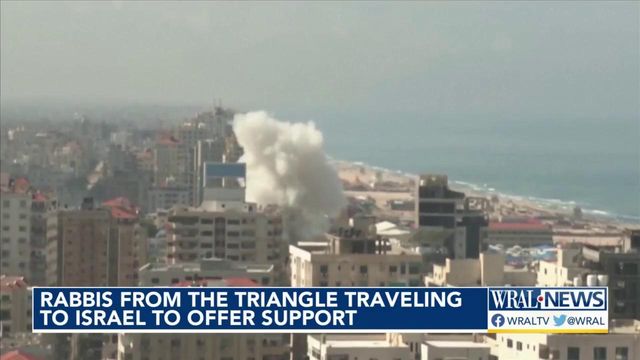Triangle rabbis traveling to Israel to visit soldiers, support families in midst of humanitarian crisis
The humanitarian crisis in Gaza is growing as Israeli forces try to root out Hamas terrorists in Gaza City.
This comes as rabbis across the U.S. are traveling to Israel to provide support and healing, including here in the Triangle.
One Triangle-area rabbi who flew out to Israel on Sunday shared his story with WRAL News.
For several weeks, we’ve seen the rallies, the protests and efforts on both sides of the conflict escalate.
"Even though it's been over a month, the devastation, the sadness, is stunning," Rabbi Eric Solomon said.
Local rabbis like Solomon are doing what they can to provide comfort and support to those in the Triangle reeling from what they’re seeing overseas.
Some have loved ones who are directly impacted. Like many others in the Jewish community, Solomon is alarmed by some of the recent criticism of Israel he’s been seeing and hearing.
More than 1,200 people in Israel have been killed, most of them in the Oct. 7 Hamas attack that started the fighting, and 242 hostages were taken from Israel into Gaza by the militant group.
"Akin to what happened on 9/11, it's like as if America should accept 9/11 and do nothing about it. It's a requirement of a country to make sure its citizens are as safe as possible," said Solomon.
Now he and other faith leaders are packing their bags to get a first-hand look.
"We're going to be visiting those who are sitting shiva one morning, from the war from the massacre, visiting hospitals and doing kind of rabbinic work and pastoral work, as well as meet with families with hostage members," Solomon said.
It’s a daunting task, yet a mission these rabbis plan to complete on the ground. They will volunteer, donate blood, visit soldiers and support families in areas hit the hardest. They'll also pray for Israel and innocent Palestinians.
"At the end of the day, Hamas is terrorizing both Israelis and innocent Palestinians," Solomon said.
Terror is never the way ever it's immoral. in Gaza. Fuel is limited, hospital areas are a war zone, but more humanitarian aid trucks are moving through the Rafah crossing. Solomon said despite some security concerns, they must help all who are suffering.
"When people are suffering when they have lost or they're in mourning. They you have to be with them," Solomon said. "You have to pray with them. You have to hold their hand. You have to give them a hug. You have to be in their space."
Rabbi Matthew Soffer is also in Israel with three other Durham faith leaders. Soffer said he talked with families, many of whom are hoping and praying their loved ones come back home after being taken hostage.
“Every single one of them not only knew someone or knows someone but loves someone – and in most cases - is family members with at least one, sometimes many, many more,” he said. “Right now, nothing could be more important to ending this war and saving lives across borders than having these 241 hostages come home.”
In the meantime, he says they are taking it day-by-day.
“They don't know what the next day will hold, but they're just trying to, to cope,” Soffer said.
In his first 24 hours there, he said he’s seen horrific scenes, where people were killed and towns were destroyed.
“There's no description; there's no way to actually convey how vulnerable and real these people were,” Soffer said.
However, he said he’s felt a strong sense of solidarity.
“[It is a] strong desire to just care for human beings, above all, care for each other, bring hostages home, and stop and get to a place where they could just live in peace,” Soffer said.
WRAL asked Soffer about his safety in Israel.
“Safety is a kind of relative thing right now. The Jewish community in North Carolina is not feeling particularly safe. The Jewish community in America, we haven't experienced any degree of antisemitism like this, since we've been measuring this hatred toward Jews. It's not like we feel all that safe as Jews, obviously. Coming here has a lot of nerves, but I'd say you know, looking at people in the eye and knowing that everybody right now is just really trying their best to care for each other, trying to just call out for these hostages to be returned to be brought home,” he said.
He says his focus is on helping the people and says he wants people to have more compassion.
“We want them to know that we care, and we want to open up avenues for compassion and for support. That's primarily what we're hoping to do. We also really want to come home and make it very clear that this is not a war on the Palestinians. This is a war against Hamas,” he said.













